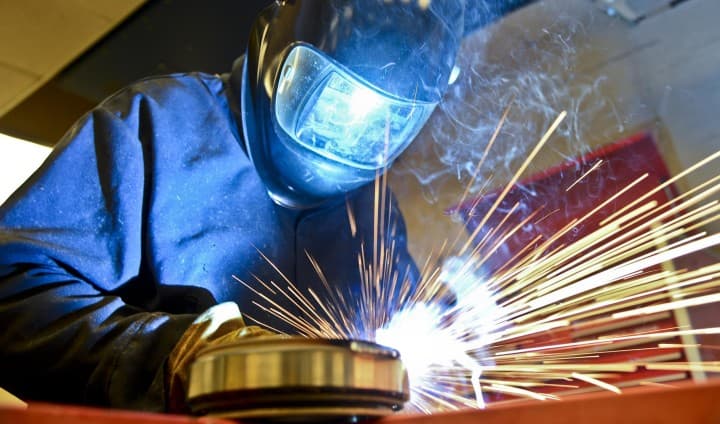Welding is a critical skill for the construction, maintenance, and repair of many parts of modern society. Working with steel, other alloys, and filler metals at high temperatures, this trade requires both focus and endurance.
If you've ever seen a welded metal structure or a skillfully repaired piece of equipment, you've witnessed the work of a welder. This article explores the role of a welder, their daily tasks, the skills required, and the impact they have in different industries.
Whether you're considering a career in welding or simply curious about this profession, read on to discover the fascinating world of welders and their work.
What is welding as a profession?
A welder is a skilled tradesperson who specializes in fusing materials together using high heat and pressure. Professional welders play a crucial role in various industries such as construction, manufacturing, and automotive, contributing to the production of essential infrastructure and products.
Welders are responsible for creating strong and durable joints between metal pieces, ensuring the structural integrity and safety of buildings, bridges, vehicles, and more. They work in potentially dangerous and challenging environments, and must wear safety gear and follow safety protocols depending on where they're working.
Welders are highly valued for their ability to work with precision and attention to detail, creating intricate and complex metal structures despite hazardous conditions. They control significant heat and power when using electrodes to fuse stainless steel parts together with molten filler material.
What exactly does a welder do at work?
A welding career will typically involve working on different types of jobs with variable safety standards, such as arc welding, gas welding, and brazing.
Their daily tasks and responsibilities include reading and interpreting blueprints, choosing the appropriate welding method, handling and setting up equipment, ensuring work meets quality standards, and following strict safety practices.
A day in the life might involve preparing metal surfaces, selecting the right power tools and components, setting up welding equipment, and performing the weld. They may also be responsible for performing quality control checks and collaborating with other tradespeople to ensure the project's success.
There are different types of welders, including production welders, structural welders, and pipefitters, each with their unique roles and duties. When you join SkillHero you get access to our database of apprenticeship programs and welding jobs.
We're always adding new openings for welders to our database, so whether you're just entering the trade or looking to advance your career, claim your free account now.
Do welders make good money?
Welders have great earning potential, with apprentices earning a median annual salary of $35,380. Journeymen earn an annual wage of $47,450 on average, and masters can command an annual salary of $68,750 or more.

In addition to competitive salaries, job satisfaction for welders is high and it's a career with opportunities for growth and overtime.
There are over 430,000 jobs held by skilled welders in America today, with most in manufacturing, construction, and other vital industries. With more than 42,000 new jobs projected to become available each year, learning how to become a welder is a solid investment in your future.
There are quite a few different trade paths welders can take, such as arc welders, energy beam welders, and construction welders. With so many different applications for this skilled trade, it's likely to remain in high demand for the foreseeable future.
Welding Trade Paths
Welding trade paths offer multiple specialization options which carry workers to unique careers. Each path allows welders to focus on specific techniques and applications, making them highly valuable to projects in their field.
Here's a quick look at the core paths:
- General Welder: Has a broad understanding of welding techniques and can perform a wide range of tasks on a variety of job sites.
- Arc Welder: Specializes in using electric currents to create an arc between an electrode and the base material, creating the required heat.
- Energy Beam Welder: Focuses on using high-energy beams, such as lasers or electron beams, to join materials together.
- Fabrication Welder: Specializes in working with metal fabrications, creating structures and components for various industries.
- Gas Welder: Uses oxy-fuel torches to generate heat and melt metals, joining them together through fusion.
- Resistance Welder: Utilizes electrical resistance to create heat and join metals together without additional filler material.
- Robotic Welding Operator: Operates automated welding systems that use robots to perform fine-tuned tasks, ensuring precise and efficient results.
- Solid State Welder: Focuses on joining materials without melting them completely, utilizing pressure or friction to bond them together.
Is welding a difficult skilled trade?
This skilled trade requires expertise, precision, and specialized knowledge as well as physical strength and endurance. It involves the use of heat and metal to create strong, durable joints in various materials.
While the work is definitely challenging, you can learn quickly on the job by joining a local apprenticeship program. SkillHero's ApprenticeConnect feature provides access to entry-level jobs that include hands-on training programs as well as classroom and one-on-one instruction.
Is welding physically and mentally demanding?
Yes, it is both physically and mentally demanding. The job requires physical strength and endurance to handle heavy materials, operate machinery, and work in hazardous environments. The physical strain can lead to fatigue and potential injuries if not properly managed.
In addition to the physical demands, welding also requires mental focus and precision. Workers must be alert and aware of potential safety hazards while performing detailed and precise work. This mental strain can be exhausting and can lead to decreased productivity and increased risk of errors if not properly managed.
Proper training and adherence to strict safety protocols is essential to reducing the likelihood of accidents. It's important for welders to receive thorough training on proper techniques and safety procedures to avoid potential injury and ensure quality work.
If you are a student looking to start your career or a skilled trade worker seeking a new position, sign up for a free SkillHero account to access training and connect with potential employers.
How to know if welding is for you
Welding requires a combination of technical aptitude, physical stamina, attention to detail, and hand-eye coordination. To excel in this field, individuals need to be comfortable working with their hands and have the ability to concentrate for extended periods.
If you're considering a career in welding, start by gaining experience through a welding program, apprenticeship, or on-the-job training. These opportunities will provide you with the hands-on experience and technical knowledge needed to succeed in the field. You can also look for other opportunities to develop your skills and knowledge, such as attending workshops or seeking certification in specialized welding techniques.
If you possess the necessary skills and qualities and enjoy working with your hands to create and repair metal structures, welding could be the perfect career for you. Sign up for a free SkillHero account to access our database of training, resources, and networking opportunities in the skilled trades.

